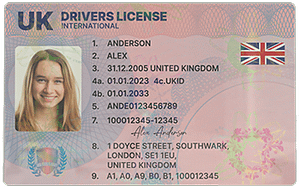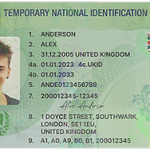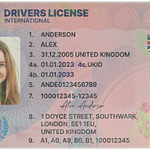Being caught with a fake ID card is a serious matter that can have significant legal and personal – related consequences. Here’s a comprehensive guide on what you should do if you find yourself in such a situation.
Remain Calm and Cooperate
The first and most crucial step when you’re caught with a fake ID is to remain calm. Panicking or acting aggressively will only worsen the situation. Law – enforcement officers are just doing their job, and cooperation is key. Follow their instructions precisely. Do not try to argue or make excuses at this initial stage. If they ask for your real identification (if you have it), provide it promptly. If they want to search you or the area where the fake ID was found, allow them to do so within the boundaries of the law.
Do Not Lie
Under no circumstances should you lie about your identity or the origin of the fake ID. Lying to law – enforcement officers can lead to additional charges, such as obstruction of justice. Be honest about your situation, although you don’t need to volunteer more information than is asked. For example, if you’re asked how you obtained the fake ID, simply state the facts without elaborating unnecessarily if not prompted. Remember, anything you say can and will be used against you in a court of law, so choose your words carefully.

Know Your Rights
It’s important to be aware of your legal rights. You have the right to remain silent. You do not have to answer any questions that may incriminate you. If you feel that the situation is getting out of hand or that you’re being pressured into saying something you don’t want to, politely inform the officers that you wish to exercise your right to remain silent. You also have the right to an attorney. If you cannot afford one, the state is required to provide you with a public defender. Request an attorney as soon as possible if you are being questioned or detained.
Understand the Charges
The charges associated with being caught with a fake ID can vary depending on several factors, such as your age, the purpose for which the fake ID was being used, and the jurisdiction. In general, it can range from a misdemeanor to a felony. Misdemeanor charges may include fines, community service, or a short – term jail sentence. Felony charges, on the other hand, are more severe and can result in longer prison terms and hefty fines. For example, if the fake ID was used to obtain alcohol by a minor, it may be considered a minor offense in some areas. However, if the fake ID was used for more serious purposes like identity theft or fraud, the charges will be much more severe.
Seek Legal Representation
Once you have the opportunity, hire a qualified criminal defense attorney. A good attorney will be familiar with the laws regarding fake IDs in your area and can build a strong defense strategy. They will review the circumstances of your arrest, the evidence against you, and look for any procedural errors that may have occurred during the arrest or investigation. For instance, if the search that led to the discovery of the fake ID was conducted without a proper warrant, your attorney may be able to have the evidence suppressed. Your attorney can also negotiate with the prosecution on your behalf, potentially resulting in reduced charges or a more favorable plea deal.
Appear in Court
You will be required to appear in court for your hearing. Make sure you attend all court dates as scheduled. Failing to appear can lead to additional warrants being issued for your arrest and more severe penalties. Dress appropriately for court, be respectful to the judge, the court staff, and everyone present. Listen carefully to what is being said and follow the instructions given by the judge and your attorney. During the court process, your attorney will present your case, cross – examine witnesses if there are any, and make arguments on your behalf.
Consider Alternative Resolutions
In some cases, there may be alternative resolutions available instead of going through a full – blown trial. For example, diversion programs may be an option, especially for first – time offenders. These programs typically involve completing certain requirements, such as community service, educational courses (like alcohol awareness courses if the fake ID was used for underage drinking), or probation. If you successfully complete the requirements of the diversion program, the charges against you may be dropped or expunged from your record. Another option could be plea bargaining, where you plead guilty to a lesser charge in exchange for a more lenient sentence.
Impact on Your Future
A conviction related to a fake ID can have long – lasting impacts on your future. It can affect your ability to get into college, obtain certain jobs, or even apply for loans. Many employers and educational institutions conduct background checks, and a criminal record can be a red flag. However, if you are able to have the charges expunged from your record through a successful diversion program or other legal means, it can mitigate some of these negative impacts. It’s important to take the situation seriously from the start to minimize the long – term consequences.
Common Problems and Solutions
Problem 1: Lack of Awareness of Rights
Many people who are caught with a fake ID are not fully aware of their legal rights. They may end up saying things that can incriminate them during the initial stages of being caught or questioned by law – enforcement.
Solution: Educate yourself about your rights in advance. You can do this by reading up on basic criminal law in your area or consulting with a legal professional. If you are ever in a situation where you are being questioned, remember the right to remain silent and the right to an attorney. Politely assert these rights if you feel uncomfortable answering questions.
Problem 2: Inability to Afford an Attorney
Some individuals may not have the financial means to hire a private criminal defense attorney, which can put them at a disadvantage in court.
Solution: Request a public defender as soon as possible. Public defenders are provided by the state for those who cannot afford legal representation. Although they may have a heavy caseload, they are still trained professionals who can advocate for you in court. You can also look into legal aid organizations in your area, which may provide free or low – cost legal services to eligible individuals.
Problem 3: Fear of the Consequences
The fear of facing severe consequences such as jail time, fines, and a criminal record can cause a great deal of stress and anxiety for those caught with a fake ID.
Solution: Seek support from family, friends, or a counselor. Having a support system can help you deal with the emotional stress. Additionally, work closely with your attorney to understand the possible outcomes and develop a plan to mitigate the consequences. By taking proactive steps, such as participating in a diversion program if available, you can reduce the severity of the penalties.
Problem 4: Unclear Evidence Against You
Sometimes, the evidence against you may be unclear or insufficient, but you may not know how to challenge it.
Solution: Your attorney will be able to review the evidence against you thoroughly. They can look for any flaws in the collection or presentation of the evidence. For example, if the fake ID was obtained through an illegal search, your attorney can file a motion to suppress the evidence. It’s important to communicate openly with your attorney about any details you remember regarding the discovery of the fake ID.
Problem 5: Difficulty in Complying with Court – Ordered Requirements
If you are ordered to complete community service, attend educational courses, or serve probation as part of your sentence, you may face difficulties in complying with these requirements.
Solution: Make a detailed plan to fulfill all the court – ordered requirements. If you have scheduling conflicts with community service or educational courses, communicate with the relevant authorities as soon as possible to see if accommodations can be made. For probation, follow all the rules and regulations strictly. If you encounter any problems during the process, such as financial difficulties in paying fines, inform your probation officer or the court so that they can work with you to find a solution.



